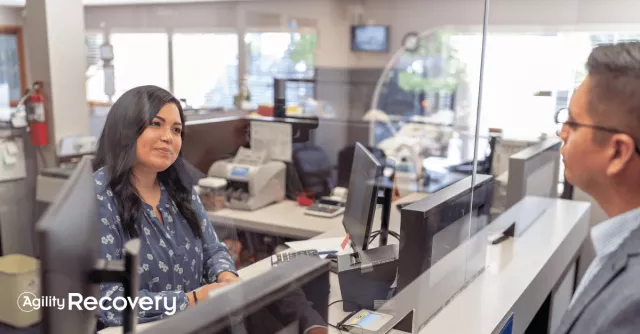Five Questions to Ask Before Choosing a BCDR Partner

However, many organizations lack the expertise and resources to develop and implement effective BCDR strategies on their own. This is where partnering with a BCDR provider can be invaluable. But with so many options available, how do you choose the right partner for your business? Here are five essential questions to ask before making your decision.
1. Is BCDR Cost Effective to Outsource?
Before your organization begins researching prospective partners, examine if it’s cost effective to outsource your BCDR needs. Outsourcing BCDR services can offer several cost advantages for businesses, but it's essential to evaluate these factors carefully in the context of your organization's specific needs and circumstances to truly determine the ROI (return on investment). Considerations include:
Cost of Staffing an In-House BCDR Team
Building and maintaining an in-house BCDR team requires significant investment in recruiting, training, and retaining specialized personnel. By outsourcing to a BCDR provider, you gain access to a team of experts with extensive experience and specialized skills in disaster recovery planning, risk assessment, and crisis management. This expertise can help streamline the BCDR process and minimize the risk of costly errors or oversights.
Subscription Costs
Outsourcing BCDR services often involves subscription-based pricing models or fixed-term contracts, providing greater predictability and control over expenses. This can be particularly advantageous for businesses operating on tight budgets or seeking to manage costs more effectively. Additionally, outsourcing allows you to avoid unexpected expenses associated with hardware upgrades, software updates, and ongoing maintenance, as these responsibilities typically fall within the purview of the service provider.
Investment in Infrastructure, Software, and Technology
Implementing an in-house BCDR solution requires substantial upfront investment in infrastructure, software, and technology. Outsourcing allows you to convert these capital expenditures into operational expenses, freeing up capital for other strategic initiatives and investments. This can improve your organization's financial flexibility and agility, especially during periods of economic uncertainty or market volatility.
Time Savings
By outsourcing BCDR services, your internal teams can focus on core business activities and strategic priorities without being bogged down by the complexities of disaster recovery planning and implementation.
2. How Does the Vendor Simplify the Recovery Process and Protect Our Team’s Capacity?
During a disaster or disruption, your team's capacity may be stretched thin as they focus on critical tasks to ensure business continuity. It's important to understand how the BCDR vendor simplifies the recovery process and supports your team during challenging times.
Be sure to ask about the vendor’s:
- Automation capabilities
- Intuitive user interfaces
- Streamlined workflows designed to minimize manual intervention and accelerate recovery efforts
- Support services
- Training programs
- Documentation resources to empower your team and enhance their effectiveness in managing BCDR activities
A vendor that prioritizes simplicity and support can help protect your team's capacity and mitigate the impact of disruptions on your business operations.
3. Can the Vendor Meet (or Exceed) Our RTO?
In the event of a disaster or disruption, time is of the essence. Therefore, take the time to understand your prospective partner's response time and recovery objectives. How quickly can they mobilize resources and initiate the recovery process? What are their guaranteed recovery time objectives (RTOs) and recovery point objectives (RPOs)? Ideally, you'll want a BCDR partner capable of providing rapid response and minimizing downtime to ensure minimal impact on your business operations. This is especially important in highly regulated industries like banks/credit unions and healthcare.
4. What Is the Vendor’s Reputation and Experience?
When evaluating potential BCDR partners, inquire about their experience and track record in the industry. Questions to ask include:
- How long have they been in business?
- Have they worked with organizations similar to yours?
- What kind of results have they achieved for their clients?
- What is their rate of success in meeting their clients’ RTOs?
A reputable BCDR partner should be able to provide case studies, testimonials, and references – all relevant to your industry and needs – to demonstrate their expertise and success in helping businesses recover from disruptions.
5. Are the Vendor’s Solutions Scalable?
Scalability is a critical consideration when evaluating BCDR partners. As your business grows and evolves, your BCDR requirements may change. Ensuring that the vendor's solutions can scale seamlessly to accommodate your organization's changing needs means you can form a long-lasting relationship. Inquire about the vendor's ability to handle increases in data volume, user traffic, and geographical expansion without compromising performance or reliability.
Also ask if the vendor can include other solutions as your organization’s needs evolve.
A scalable BCDR solution will enable you to adapt to changing circumstances and future-proof your business continuity strategy, maximizing the long-term value of your investment.
Bonus: Does the Vendor Provide Additional Value Beyond Recovery?
BCDR vendors often provide more than just recovery services, making them a true partner to your business, rather than simply a vendor. Explore if they offer some of the following options as well.
Training and Testing
BCDR planning is not a one-time effort but an ongoing process that requires regular review, testing, and refinement. Ask your potential partner about their approach to continuous improvement and testing. Do they conduct regular assessments and audits of your BCDR plan to identify weaknesses and areas for improvement? How frequently do they perform disaster recovery drills and simulations? A proactive and responsive BCDR partner will prioritize continuous improvement and ensure that your organization remains resilient in the face of evolving threats.
Resources
In addition to providing training and testing, BCDR partners may provide access to guides, workshops, online courses, templates, or a knowledge base. These options allow your team to improve their own BCDR knowledge and capabilities.
Preparation
Ask about the vendor's readiness assessments, tabletop exercises, and other preparedness activities designed to test and validate your BCDR plans and capabilities. Also inquire whether the partner runs their own tests and risk assessments in house.
By investing in training, resources, and preparation, you can ensure that your team is well equipped to respond effectively to any potential disruptions and minimize the impact on your business operations.
Agility Recovery: Your Partner in BCDR
Once you’ve decided to move forward in outsourcing some, or all, of your BCDR efforts, reach out to Agility Recovery. Agility is a true partner in our members’ BCDR efforts, offering training, support, resources, and scalability. Try out our ROI calculator or make an appointment with an expert today.



